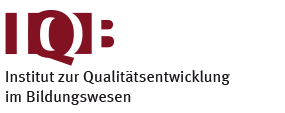Reading in Secondary Education (LISA)
Inhaltsverzeichnis
Hinweise zur Nutzung der Daten
> Scientific Use Files beantragen
| Datensatz veröffentlicht am | 13.04.2021 |
|---|---|
| Version | v2 |
| aktuelle Version verfügbar seit | 15.03.2022 |
| Erhebungszeitraum | 2011 |
| Stichprobe | Schüler*innen der Jahrgangsstufe 11 (N=1.880) an allgemeinbildenden Gymnasien |
| Erhebungseinheit | Schüler*innen |
| erfasste Kompetenzen | Fremdsprachenkompetenz: Englisch, Funktionale kommunikative Kompetenz, Hör-/ Hörsehverstehen, Leseverstehen |
| Region | Schleswig-Holstein |
| Leitung | Köller, Prof. Dr. Olaf |
| Datengebende | Köller, Prof. Dr. Olaf |
| Link zur Studie | https://www.forschungsdaten-bildung.de/studien/809-lisa-lesen-in-der-sekundarstufe |
| Verwandte Studien | LISA 6 (DOI: 10.5159/IQB_LISA_6_v1) |
| Zitationsvorschlag | Kampa, N., Fleckenstein, J., Schmidt, F.T.C., Meyer, J., Enke, F. & Köller, O. (2021). Lesen in der Sekundarstufe (LISA) (Version 2) [Datensatz]. Berlin: IQB – Institut zur Qualitätsentwicklung im Bildungswesen. http://doi.org/10.5159/IQB_LISA_v2 |
| Datenrestriktion / Zugangshinweise | Es gibt keine spezifischen Datenrestriktionen. |
Projektbeschreibung
Den Schwerpunkt der Studie „LISA - Lesen in der Sekundarstufe" in Schleswig-Holstein bildete die längsschnittliche Untersuchung von Entwicklungsverläufen im verkehrssprachlichen Leseverstehen und der Lesemotivation sowie die Rückführung dieser Verläufe auf in den Schüler*innen bzw. in der Gestaltung schulischer Lernumwelten liegende Faktoren. Ab Jahrgangsstufe 8 ("Lisa 3") wurden neben verkehrssprachlichen Leseleistungen auch Lese- und Hörverstehensleistungen in der ersten Fremdsprache Englisch mitberücksichtigt. Die hier vorliegenden Daten von LISA 5 – dem fünften Erhebungszeitpunkt der Studie – umfassen die 11. Jahrgangsstufe. Hier wurden nur Schulformen des allgemeinbildenden Systems, vornehmlich allgemeinbildende Gymnasien (und wenige Gesamtschulen), betrachtet. Betrachtet wurden die Leistungen nach dem Eintritt in die Sekundarstufe II. Berücksichtigt wurden die Domänen Sprachverständnis in der ersten Fremdsprache Englisch. LISA 5 fokussierte unter anderem auf eine Beschreibung der Motivation, sozialen Herkunft, Einstellungen zum Lesen, zum Englischen und zum Englischunterricht sowie zu beruflichen Interessen von Abiturient*innen an allgemeinbildenden Gymnasien in Schleswig-Holstein. Als dritte, für LISA 5 spezifische Fragestellung resultierte innerhalb des Längsschnitts an allgemeinbildenden Gymnasien die Möglichkeit, die Leistungsentwicklung im Fach Englisch im Verlauf der Sekundarstufe II systematisch zu untersuchen und etwa auf inner- und außerschulische Lerngelegenheiten zurückzuführen. (Projekt/IQB)
Blank data sets
For a first overview of the data set and its variables, dummy data sets containing the variables used and the value labels relating to them are provided for download here.
Documentation
Here you can find further documentation.
 LISA: Scaling Manual (German version)
LISA: Scaling Manual (German version) LISA: Documentation (German version)
LISA: Documentation (German version)
Notes on the use of the data
It is possible to link English competency tests to the LISA 6 dataset. Further longitudinal linking for competency tests is not possible. It is possible to look at individual constructs of the student questionnaire via the longitudinal section. We will be happy to advise you on this.
Up to and including LISA 5, the acronym "LISA" stood for "Reading in Secondary Education". For LISA 6, the study design was expanded. This was also reflected by a change in the name of the study: "Educational Outcomes of Students from Vocational and Academic Upper Sesondary Schools (LISA 6)".
Literature
Selected literature is listed  here (as of March 2022).
here (as of March 2022).
2021
Kampa, N., Fleckenstein, J., Schmidt, F. T. C., Meyer, J., Enke, F. & Köller, O. (2021). Lesen in der Sekundarstufe (LISA) (Version 2) [Datensatz]. Berlin: IQB - Institut zur Qualitätsentwicklung im Bildungswesen. https://doi.org/10.5159/IQB_LISA_v2
Muntoni, F., Wagner, J. & Retelsdorf, J. (2021). Beware of Stereotypes: Are Classmates' Stereotypes Associated With Students' Reading Outcomes? Child Development, 92(1), 189–204. https://doi.org/10.1111/cdev.13359
2017
Retelsdorf, J. & Schmidt, F. T. C. (2017). Gewohnheit macht den Meister: Lesegewohnheit als vermittelnde Variable des Zusammenhangs von Leseselbstkonzept und Leseleistung. In J. Retelsdorf, F. Zimmermann, A. Südkamp & O. Köller (Hrsg.), Im Blickpunkt pädagogisch-psychologischer Forschung: Selbstbezogene Kognitionen, sprachliche Kompetenzen und Professionalisierung von Lehrkräften. Festschrift für Jens Möller (S. 151–164). Münster: Waxmann.
Retelsdorf, J., Zimmermann, F., Südkamp, A. & Köller, O. (Hrsg.). (2017). Im Blickpunkt pädagogisch-psychologischer Forschung: Selbstbezogene Kognitionen, sprachliche Kompetenzen und Professionalisierung von Lehrkräften. Festschrift für Jens Möller. Münster: Waxmann.
2016
Schmidt, F. T. C. & Retelsdorf, J. (2016). A New Measure of Reading Habit: Going Beyond Behavioral Frequency. Frontiers in Psychology, 7, 1364. https://doi.org/10.3389/fpsyg.2016.01364
2015
Leucht, M., Retelsdorf, J., Pant, H. A., Möller, J. & Köller, O. (2015). Effekte der Gymnasialprofilzugehörigkeit auf Leistungsentwicklungen im Fach Englisch. Zeitschrift für Pädagogische Psychologie, 29(2), 77–88. https://doi.org/10.1024/1010-0652/a000153
Retelsdorf, J., Schwartz, K. & Asbrock, F. (2015). “Michael can’t read!” Teachers’ gender stereotypes and boys’ reading self-concept. Journal of Educational Psychology, 107(1), 186–194. https://doi.org/10.1037/a0037107
Volodina, A., Nagy, G. & Retelsdorf, J. (2015). Berufliche Interessen und der Übergang in die gymnasiale Profiloberstufe: Ihre Struktur und Vorhersagekraft für das individuelle Wahlverhalten. Zeitschrift für Pädagogische Psychologie, 29(2), 89–100. https://doi.org/10.1024/1010-0652/a000154

